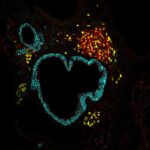
Publication: IL-4 confers NK stimulatory capacity to murine dendritic cells: a signaling pathway involving KARAP/DAP12-triggering receptor expressed on myeloid cell 2 molecules.
Published in: J Immunol 2004 May; 172(10): 5957-66
Authors: Terme M, Tomasello E, Maruyama K, Crépineau F, Chaput N, Flament C, Marolleau JP, Angevin E, Wagner EF, Salomon B, Lemonnier FA, Wakasugi H, Colonna M, Vivier E, Zitvogel L
Summary
Dendritic cells (DC) regulate NK cell functions, but the signals required for the DC-mediated NK cell activation, i.e., DC-activated NK cell (DAK) activity, remain poorly understood. Upon acute inflammation mimicked by LPS or TNF-alpha, DC undergo a maturation process allowing T and NK cell activation in vitro. Chronic inflammation is controlled in part by Th2 cytokines. In this study, we show that IL-4 selectively confers to DC NK but not T cell stimulatory capacity. IL-4 is mandatory for mouse bone marrow-derived DC grown in GM-CSF (DC(GM/IL-4)) to promote NK cell activation in the draining lymph nodes. IL-4-mediated DAK activity depends on the KARAP/DAP12-triggering receptor expressed on myeloid cell 2 signaling pathway because: 1) gene targeting of the adaptor molecule KARAP/DAP12, a transmembrane polypeptide with an intracytoplasmic immunoreceptor tyrosine-based activation motif, suppresses the DC(GM/IL-4) capacity to activate NK cells, and 2) IL-4-mediated DAK activity is significantly blocked by soluble triggering receptor expressed on myeloid cell 2 Fc molecules. These data outline a novel role for Th2 cytokines in the regulation of innate immune responses through triggering receptors expressed on myeloid cells.
Link to Pubmed [PMID] – 15128777

